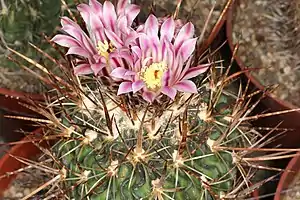Stenocactus obvallatus
Stenocactus obvallatus ist eine Pflanzenart in der Gattung Stenocactus aus der Familie der Kakteengewächse (Cactaceae). Das Epitheton der Art leitet sich von der lateinischen Vorsilbe „ob-“ für ver- und dem Verb „vallare“ für umzingeln, mit einem Wall umgeben ab und bedeutet so viel wie von Dornen verhüllt.
| Stenocactus obvallatus | ||||||||||||
|---|---|---|---|---|---|---|---|---|---|---|---|---|

Stenocactus obvallatus | ||||||||||||
| Systematik | ||||||||||||
| ||||||||||||
| Wissenschaftlicher Name | ||||||||||||
| Stenocactus obvallatus | ||||||||||||
| (DC.) A.Berger |
Beschreibung
Der gewöhnlich einzelne, aber manchmal auch zweistämmige, graugrüne Pflanzenkörper ist gedrückt kugelförmig bis kugelförmig und erreicht Durchmesser von 6 bis 11 Zentimeter. Seine 30 bis 50 dünnen, welligen Rippen sind an den Areolen sehr breit. Auf jeder Rippe befinden sich 2 bis 4 Areolen. Die 4 Mitteldornen, von denen der obere abgeflacht und breit ist, sind rötlich braun und bis 5 Zentimeter lang und 3 bis 4 Millimeter breit. Die 4 bis 6 weißen Randdornen sind bis zu 1 Zentimeter lang.
Die am Scheitel erscheinenden blassgelben bis weißen Blüten sind ziemlich groß und haben eine rötliche Mitte. Die Kronblätter sind länglich zugespitzt.
Über das Aussehen der Früchte ist nichts bekannt.
Verbreitung, Systematik und Gefährdung
Stenocactus obvallatus ist in Mexiko im Bundesstaat México und im Hauptstadtbezirk Distrito Federal verbreitet.
Die Erstbeschreibung der Art erfolgte 1828 durch Augustin-Pyrame de Candolle als Echinocactus obvallatus.[1] George Lawrence verwendete 1841 den Namen Echinofossulocactus obvallatus.[2] Alwin Berger stellte 1929 die Art in Illustrierte Handbücher sukkulenter Pflanzen: Kakteen in die Gattung Stenocactus.[3]
Synonyme zur Art sind:
- Echinocactus pentacanthus Lem.[4]
- Echinofossulocactus pentacanthus (Lem.) Britton & Rose[5]
- Stenocactus pentacanthus (Lem.) A.Berger[3]
- Cactus pentacanthus Kuntze[6]
- Echinofossulocactus caespitosus Backeb.[7]
In der Roten Liste gefährdeter Arten der IUCN wird die Art als „Data Deficient (DD)“, d. h. mit keinen ausreichenden Daten geführt.[8]
Nachweise
Literatur
- Echinofossulocactus obvallatus (De Candolle) Lawrence. In: N. L. Britton, J. N. Rose: The Cactaceae. Descriptions and Illustrations of Plants of the Cactus Family. Band III. Washington 1922, S. 115.
- Echinofossulocactus obvallatus (DC.) Lawr. In: Curt Backeberg: Die Cactaceae: Handbuch der Kakteenkunde. Band V. 2. Auflage. 1984, ISBN 3-437-30384-8, S. 2782f.
- Stenocactus obvallatus (A.P. de Candolle) A. Berger ex A.W. Hill In: Edward F. Anderson: The Cactus Family. Timber Press, Portland (Oregon) 2001, ISBN 0-88192-498-9, S. 639f.
- Echinofossulocactus obvallatus (DC.) Lawr. In: Walther Haage: Kakteen von A bis Z. 3. Auflage. Quelle & Meyer, Heidelberg 1986, ISBN 3-494-01142-7, S. 164.
Einzelnachweise
- Mémoires du Museum d'Histoire Naturelle. Band 17, Paris 1828, S. 37–38, Tafel 9.
- George Lawrence: Catalogue of Cacti in the Collection of the Rev. Theodore Williams, at Hendon Vicarage, Middlesex. In: Gardener's Magazine and Register of Rural and Domestic Improvement. [Herausgegeben von J. Loudon], Band 17, London 1841, S. 313–319 online
- Illustrierte Handbücher sukkulenter Pflanzen: Kakteen. S. 346, 1929
- Cactearum Aliquot Novarum ac Insuetarum in Horto Monvilliano... S. 27, 1838
- The Cactaceae. Descriptions and Illustrations of Plants of the Cactus Family. Washington 1922, Band III, S. 115
- Revisio Generum Plantarum: vascularium omnium atque cellularium multarum secundum leges nomeclaturae internationales cum enumeratione plantarum exoticarum in itinere mundi collectarum..., Leipzig 1891. S. 261
- Cactus and Succulent Journal of Great Britain. Band 12, S. 81, Abb., London 1950
- Stenocactus obvallatus in der Roten Liste gefährdeter Arten der IUCN 2021-1. Eingestellt von: Gómez-Hinostrosa, C., Sánchez, E., Guadalupe Martínez, J. & Bárcenas Luna, R., 2009. Abgerufen am 18. April 2021.